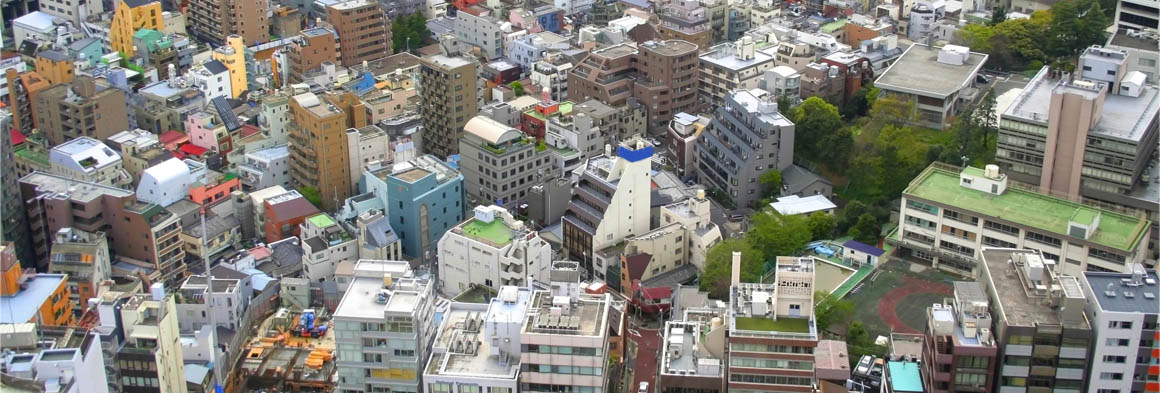Accommodation

Accommodation
Living costs in Japan and especially in Tokyo are known to be among the world’s highest. Japanese apartment sizes are usually smaller than in most other industrialized nations. In Japanese big cities, you will find modern skyscrapers and residential complexes, which are of very high standard and technologically very advanced, but there are also many houses, which look relatively simple and old-fashioned, if not to say „shabby“. For many Japanese, housing seems not to be a priority, and they prefer to spend their money on other things, such as food or cars. Anyway, even the small and „old“ houses in Tokyo are very expensive to buy or rent, as space is very limited and demand is high.
However, there are ways to enjoy Tokyo without spending a fortune. The following accommodation options are feasibile for those who are on a Working Holiday:
Share Houses
“Share Houses“ are simply put, houses that you share with others. Even for many (young) Japanese, it is very common to live in a share house. They prefer it to staying at a small apartment on their own, because it is not only cheaper, but also offers other amenities, such as shared installations, common areas, and getting to know like-minded people. The term “social housing” exists in Japan, meaning that you share the house with other people of the same interest, e.g. “Rock music”. Such houses would then have for instance a common collection of records or music instruments.
There are several chains of share house companies in Japan. Some chains manage hundreds to thousands of small single-family houses with 4-5 rooms. You would share bathroom, kitchen and living room with the others sharing the house with you. These houses are often old-fashioned or even not well maintained in terms of sanitary installations, furniture, interiour design etc. Some other chains run large houses with 50-100 rooms that typically previously belonged to large companies that used these buildings for their employees. Such share houses exist from simple standard to luxury standard. The luxury share houses even have shared movie theater rooms, libraries etc.
Share houses sometimes have quotas of how many Japanese and how many Westerners they want to accept.
A dorm bed at a share house in central Tokyo is about 45,000-60,000 JPY per month. Single rooms are between 80,000-100,000 JPY. Cheaper options exist, but are often either very tiny, of very low standard, or you would have to share the dorm room with 12 or more people. If you stay in Yokohama, Saitama, Chiba or in the very West of Tokyo prefacture, rents are around 25-30% cheaper, but if you have to commute to central Tokyo every day for your work or language lessons, you don’t really save, as commuting expenses apply (and commuting times of 60-90 minutes one-way).
In other larger cities (e.g. Osaka, Nagoya) the rents are similar, but the rooms might be more spacious than in Tokyo. In smaller cities or in the country side, Share Houses might not exist.
Host families
Staying with a host family gives you the opportunity to practice your Japanese language skills and to get first-hand cultural learning experiences.
On weekdays the Japanese host family usually offers you breakfast and dinner, whereas on weekends (Saturday and Sunday) they also provide lunch.
Typical host families are usually composed of parents in their 20s or 30s with one or two small children, or they are in their 50s or 60s when their children have already left the parental household. Usually you don’t find host families in central Tokyo as spaces are too limited to accommodated guests, but they would rather live in Chiba, Yokohama, or Saitama,
Staying with a host family would typically cost you around 80,000-85,000 JPY per month. If you work or attend language lessons in central Tokyo, you would have to add commuting costs.
Apartments
In Japan, as a foreigner who stays for a limited duration of time only, it is not so easy to rent an apartment on your own. The reasons are that first, usually many landlords won’t rent to foreigners as they expect language barriers, cultural differences etc. that just seem to much unnecessary complication to them if they can also rent to a Japanese. Second, landlords usually want to see that you have an unlimted fully salaried work contract, that you won’t have if you are on a Working Holiday. Third, the minimum contract duration of renting an apartment in Japan is typically one full year. Fourth, you would have to pay a high procuration fee (reikin) to the real estate agent, which doesn’t make too much sense if you stay for a relatively short time only. Fifth, most apartments come unfurnished, so you would have to buy all of your furniture.

Leave a Reply
You must be logged in to post a comment.